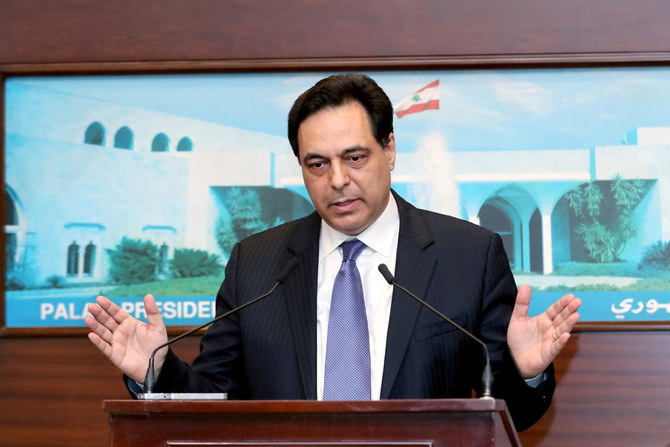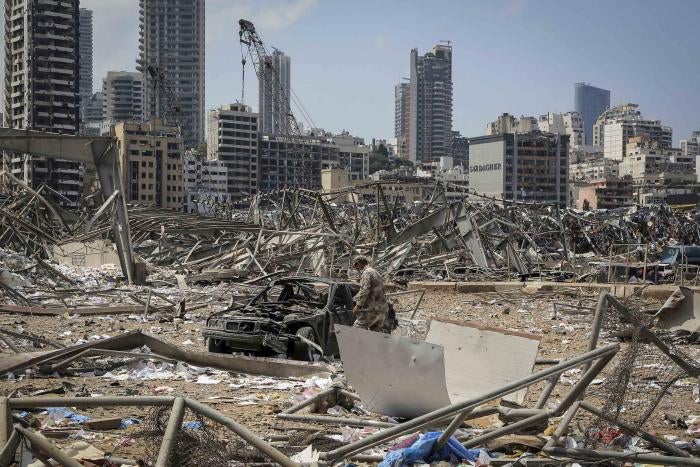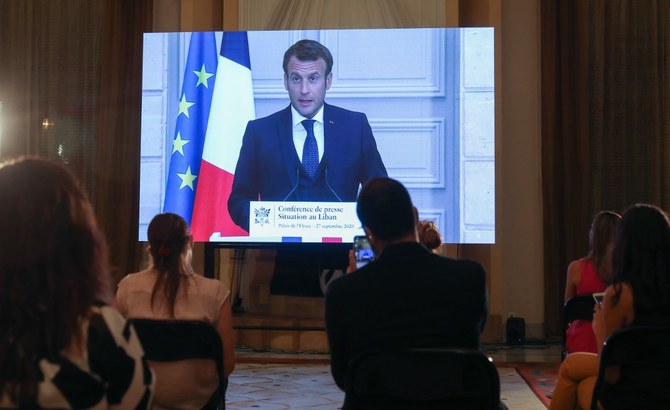
by NAJIA HOUSSARI -- arabnews.com -- BEIRUT: The judicial investigator of the Beirut port bombing has said he will interrogate caretaker Prime Minister Hassan Diab at 9 a.m. on Friday. The move means the judge has decided to proceed with his allegations against those accused of involvement in the explosion crime on Aug. 4, in which 202 people were killed. Judge Fadi Sawan was supposed to go to the Prime Minister’s office on Monday to interrogate Diab after he had charged him and 3 other ministers with “negligence causing the death and injury of hundreds of people.” The massive explosion of tons of ammonium nitrate injured more than 6,500 people and destroyed Beirut’s waterfront and entire residential neighborhoods.
Arab News learned from judicial sources that Judge Sawan also set next Friday as a date for the questioning of the former Minister of Public Works and Transport Ghazi Zaiter. On Tuesday, Judge Sawan is scheduled to question two defendants, a member of the Higher Council of Customs, Hani Hajj Shehadeh, and the former customs chief, Moussa Hazimeh. The former Minister of Finance, Ali Hassan Khalil, and the former Minister of Public Works and Transportation, Youssef Fenianos, is to be questioned on Thursday. Zaiter and Hassan Khalil said that they would not appear before Judge Sawan for questioning because “Sawan is violating constitutional principles.” The Prime Minister’s media office repeated Diab’s previous position, which “respects the constitution that has been violated by Judge Sawan.” On Monday, Diab resumed his job as usual in the Prime Minister’s office according to a schedule that did not include an appointment with Judge Sawan. Mohammed Fahmy, interior minister in the caretaker government, confirmed his rejection of “targeting the prime minister’s position in the Beirut port explosion case because of the consequences of a 7-year-old complicated file cannot be blamed on a prime minister who has only been in office for a few months.”

By Bénédicte Jeannerod -- Aya Majzoub -- hrw.org/news/ -- Two days after the catastrophic August 4 explosion that devastated half of Beirut, Lebanon’s capital, and killed more than 200 people, President Emmanuel Macron walked through the city’s gutted streets. Surrounded by Beirut’s residents enraged over their leaders’ wanton disregard for their lives, Macron reassured them that, “I’m not here to help them, I’m here to help you.” Macron said all the right things. He promised that much-needed aid would not fall into corrupt hands, he called for an international investigation and warned that “the time for responsibility has arrived,” and he insisted on the importance of political and economic reforms. But almost four months later, there is hardly anything to show for Macron’s proclamations. Life for almost everyone in Lebanon has continued to get worse. More and more people are sliding into poverty, with over half the population struggling to afford basic necessities. The physical damage is still striking in the hardest-hit neighborhoods, scores of buildings are at risk of collapse, and thousands of families have still not been able to return home. Even though senior Lebanese political and security officials knew about the presence of recklessly stored ammonium nitrate in Beirut’s port, none have been held accountable yet in a domestic investigation riddled with due process violations and allegations of political interference.
Lebanon’s leaders have not even been able to form a government. Instead, the same political leaders conduct business as usual and prioritize sectarian and clientelist considerations while the country falls apart. Unfortunately, anyone in Lebanon could have told Macron that betting that the same political elite who have been robbing the country would carry out reforms that weakened their stranglehold wasn’t going to happen -- at least not without tremendous domestic and international pressure. It is crucial that Macron doesn’t jettison his ambitious Lebanon plan as a “risky bet” that didn’t pay off. Releasing the pressure on Lebanon’s leaders now risks emboldening the corrupt political system – which France helped establish throughout history – and lends credence to these leaders’ claims that there is no alternative. It also risks further disillusioning an angry, disenfranchised citizenry who are increasingly choosing to emigrate as they lose hope for a better future in the country. If Macron really wants to help the Lebanese people, he needs to take the punitive measures on those Lebanese leaders responsible for ongoing abuses that he promised in September and mobilize broader international support for them, including from the US and EU.

by arabnews.com -- NAJIA HOUSSARI -- BEIRUT: As the UN hosted a second International Conference on Assistance and Support to Beirut on Wednesday, there was growing impatience among donors with Lebanese politicians. The virtual event, chaired by French President Emmanuel Macron and UN Secretary-General António Guterres, aimed to coordinate international aid efforts in support of the Lebanese people as the country continues to face political, economic and social challenges. The participants — including heads of state, international organizations, donors, NGOs and civil-society representatives — discussed the results of the first conference, which was organized by France after the Beirut port explosion and held on Aug. 9. It resulted in pledges of aid worth about $300 million in a fund managed by the World Bank that will be channeled through UN agencies and NGOs rather than Lebanese state institutions. However, delegates expressed impatience with the failure of political factions in Lebanon to resolve their differences and work together for the good of their country. Four months after the Aug. 4 explosion in Beirut, and the subsequent resignation of Hassan Diab’s government, a new government has yet to be formed, delaying the economic and political reforms needed to begin efforts to resolve the financial crisis.
According to Reuters, the French presidency on Wednesday said: “No measures required in the French road map for Lebanon have been implemented and the Lebanese Central Bank’s accounts haven’t been audited.” It added: “American sanctions imposed on the Lebanese political class have not had any effect so far and will not help in forming a government.” This came after the leak of a conversation in which Dorothy Shea, the US ambassador to Lebanon, asked Nabih Berri, speaker of the Lebanese parliament, to “distance himself from Hezbollah.” She also hinted that “Washington will reject any government in which Hezbollah is represented and there won’t be any foreign aid without radical change.”

by HAFED AL-GHWELL -- arabnews.com -- Despite external and domestic pressure to form a new Lebanese government, endless jockeying for key ministerial posts continues while the country remains on a slow path to implosion. If it is not the financial crisis that wiped out savings, it is an economic crisis that has decimated jobs and the viability of most small businesses. If it were not the Aug. 4 port blast that made thousands of homes uninhabitable and shut down hundreds of businesses, it is a pandemic that has shattered mobility and overwhelmed a dismal public health system. If it is not the governance crisis that has eroded confidence in political leadership, it is worsening sectarian fragmentation justifying a defense of the status quo instead of efforts to secure a future all Lebanese can share. All these issues affect every Lebanese regardless of age, sect, religion, status, political affiliation, level of education or any other demographic division. Yet surprisingly, there is little momentum and even less political will to find solutions.
Decades of close French-Lebanese ties have placed Paris at the forefront of developments in Lebanon’s political leadership. Virtual donor meetings are reminiscent of the post-civil war aid conferences; now, as then, funds will vanish, without any reforms against a backdrop of further civil unrest. Granted, French President Emmanuel Macron’s carrot of funding in exchange for reform does indicate wariness of a repeat of the 1990s post-civil war reconstruction fiasco if the same faces remain in power. Unfortunately, the changes Macron seeks are doomed to fail given the glacial pace of Lebanese governance crippled by incessant political wrangling. No carrot or stick can guarantee the Lebanese political elite will implement the desperately needed reforms in governance, finance, politics and the economy. Demanding the formation of a government of independent technocrats, however, necessary, will simply exacerbate gridlock and political wrangling. The same applies to calls for judiciary reforms and a commitment to elections within a year under new election laws. They run counter to how Lebanon’s political “old guard” have consistently tied their legitimacy and fortunes to how much political power they can wield in defense of their own interests.
Khazen History


Historical Feature:
Churches and Monasteries of the Khazen family

St. Anthony of Padua Church in Ballouneh
Mar Abda Church in Bakaatit Kanaan
Saint Michael Church in Bkaatouta
Saint Therese Church in Qolayaat
Saint Simeon Stylites (مار سمعان العامودي) Church In Ajaltoun
Virgin Mary Church (سيدة المعونات) in Sheilé
Assumption of Mary Church in Ballouneh
1 - The sword of the Maronite Prince
2 - LES KHAZEN CONSULS DE FRANCE
3 - LES MARONITES & LES KHAZEN
4 - LES MAAN & LES KHAZEN
5 - ORIGINE DE LA FAMILLE
Population Movements to Keserwan - The Khazens and The Maans
ما جاء عن الثورة في المقاطعة الكسروانية
ثورة أهالي كسروان على المشايخ الخوازنة وأسبابها
Origins of the "Prince of Maronite" Title
Growing diversity: the Khazin sheiks and the clergy in the first decades of the 18th century
Historical Members:
Barbar Beik El Khazen [English]
Patriach Toubia Kaiss El Khazen(Biography & Life Part1 Part2) (Arabic)
Patriach Youssef Dargham El Khazen (Cont'd)
Cheikh Bishara Jafal El Khazen
Patriarch Youssef Raji El Khazen
The Martyrs Cheikh Philippe & Cheikh Farid El Khazen
Cheikh Nawfal El Khazen (Consul De France)
Cheikh Hossun El Khazen (Consul De France)
Cheikh Abou-Nawfal El Khazen (Consul De France)
Cheikh Francis Abee Nader & his son Yousef
Cheikh Abou-Kanso El Khazen (Consul De France)
Cheikh Abou Nader El Khazen
Cheikh Chafic El Khazen
Cheikh Keserwan El Khazen
Cheikh Serhal El Khazen [English]
Cheikh Rafiq El Khazen [English]
Cheikh Hanna El Khazen
Cheikha Arzi El Khazen
Marie El Khazen